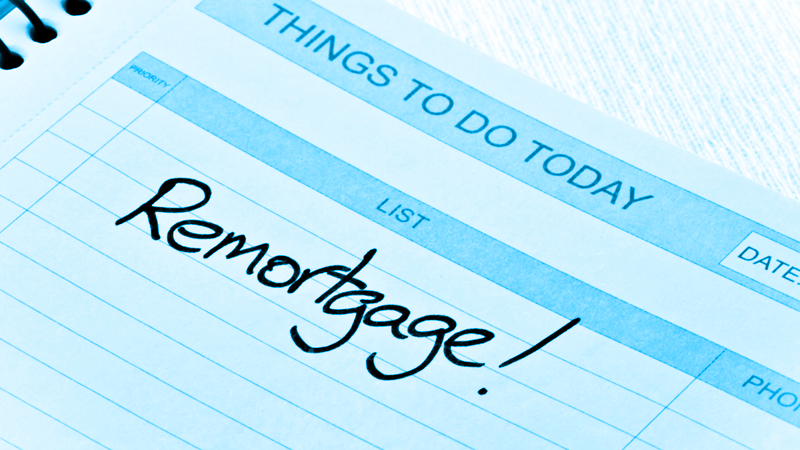How can you remortgage your home if you have a poor credit score?
We won’t beat around the bush.
Yes, bad credit remortgages can be difficult but don’t worry. It isn’t impossible to get a mortgage with a bad credit rating.
There are lenders out there who will consider you for a remortgage application, even if your credit history is less clean and more colourful.
Can I Remortgage With Bad Credit History?
Yes, absolutely.
It is important to remember that some “blotches” on your credit report carry more weight than others and it’s still possible for you to remortgage with bad credit.
Lenders are more likely to be lenient if you missed a bill payment a couple of years ago, with a good explanation.
On the other hand, if you’ve recently missed more than one mortgage payment in a row, lenders may be less likely to believe that you’re able to keep to your repayment schedule.
Luckily, each lender has different criteria for assessing your credit score.
In fact, you might be pleased to know that some lenders don’t actually credit score at all.
This means that even if your current mortgage provider may not offer you a new rate, another lender out there might. It’s all about finding the right lender for you.
Check Today's Best Rates >
Will owning my property outright make a difference?
Typically not.
This is usually referred to as an unencumbered mortgage and faces the same requirements as a standard remortgage.
It’s largely dependent on your reason for remortgaging.
Ultimately, bad credit remortgages on unencumbered properties are placed under the same scrutiny as a standard mortgage.
Bad Credit Remortgages – reasons for remortgaging?
There are plenty of reasons you might want to remortgage, even if you do have bad credit.
These could include:
- Debt consolidation. This is when you want to add your existing debts to your monthly mortgage payment. This can often result in a lower interest rate on your other debts, enabling you to pay them off quicker.
- Home renovations. If your home is in need of some serious TLC, remortgaging can be a great way to raise the funds for an extension, essential repairs or even that much-needed new kitchen.
- A considerable purchase. Maybe you’re in desperate need of a new car? Or want to buy a new property? If you need money for a large purchase, remortgaging can be a good option.
There are many other reasons, check out the most common reasons for remortgaging in recent years article, for a summary.
Check Today's Best Rates >
What would be classed as adverse credit on your credit file?
Your bad credit rating could be the result of a number of things.
Perhaps you’ve previously missed bill payments or had mortgage arrears.
You might even be using a debt management plan to repay what you owe.
Each adverse event on your credit record will have a different effect on your credit report.
The more blotches you have on your record, the more reluctant banks may be to lend to you.
Our advisors have arranged for people with bad credit remortgages in the following circumstances:
- Low credit score
- Late payments
- Mortgage arrears
- Defaults
- CCJs
- Debt management plans
- IVA
- Bankruptcy
- Repossession
Each blemish or adverse credit event you’ve had will be shown on your credit report and impact your credit score.
It’s still possible to remortgage with bad credit, but it will be more difficult.
The difficulty of the application will depend on factors such as the types of events when they occurred and how much equity you have in your property.
Lenders take your credit history into account since a borrower that has had credit issues in the past is more likely to have issues in the future.
If you’re going to apply for a remortgage with bad credit, lenders may be less inclined to approve the application and if they do, they will usually offer a subprime rate.
Call us today on 01925 906 210 or contact us to speak to one of our friendly advisors.
However, that isn’t always the situation. It all depends on your individual circumstances, which means there may be more options available to you than you first thought.
Our brokers will be able to assess your situation before finding a lender to suit your circumstances.
Not only does this help to protect your credit rating, but it also saves you a lot of time.
Related quick help remortgage guides:
If you would like to learn more about how lenders view specific adverse credit situations and how specialist lenders can help, continue reading on for further details.
The important thing to remember is that if you are making an application for a remortgage and have some kind of bad credit on your file, even specialist lenders will likely be more cautious.
As part of the decision process, lenders will consider the following:
- The loan-to-value, or LTV – is basically the size of your mortgage balanced against the value of the property you want to purchase. This term is often given as a percentage. For example, the greater the deposit you provide and the greater the equity in your property, the lower your LTV and the better mortgage terms you are likely to be offered.
- Deposit – the higher the deposit you can offer, the better mortgage offer you are likely to receive.
- Income – the amount you want to borrow vs how much you earn is an important consideration. Typically, the majority of lenders will only lend around 3.5 times your annual salary.
Of course, there are other factors that will relate to your specific circumstances, including your credit history and current financial status.
Let’s explore how some common bad credit scenarios can impact your application…
Check Today's Best Rates >
Can I Remortgage with no credit history?
With no credit history, this means that you essentially have nothing on your credit report, as you have borrowed no money in the last 7 years.
No credit history can read the same way as poor credit when it comes to remortgaging.
Can I Remortgage with a low credit score?
All lenders will take a look at your credit history before making a decision on your eligibility for a remortgage.
A low credit score or poor credit history will certainly affect your chances of securing a loan with most lenders.
This doesn’t mean that you won’t be able to remortgage with a low credit score, it just means that you will need to go through a specialist lender.
There a number of lenders out there that will specialise in poor credit remortgages, so speak to a whole market mortgage advisor.
This is instead of putting applications in with numerous banks which may further adversely affect your credit rating.
Can I remortgage with late mortgage payments or missed mortgage payments?
Mortgage arrears can be a serious issue if you are hoping to remortgage, especially if there are other poor credit issues to consider.
This is because late or missed mortgage payments are deemed as the most severe kind of default, indicating a real risk in the ability of a lender to make their repayments.
Your eligibility for a remortgage with arrears will depend on how historical they are and the size of the deposit you have.
There are poor credit mortgage lenders out there that can help you remortgage even if you have recent arrears on file.
Can I Remortgage with CCJ’s?
There is an increasing number of lenders that will consider those with County Court Judgements (CCJs).
Having a CCJ doesn’t prevent you from remortgaging, with the key factor being the date of the CCJ.
The longer ago the CCJ was issued the better your chance of being accepted for a remortgage.
The number of CCJs and whether they were satisfied or unsatisfied will also be taking into consideration for a poor credit remortgage.
Can I Remortgage with IVAs?
The eligibility criteria for a remortgage with an Individual Voluntary Arrangement (IVA) will differ depending on whether you have a current IVA or a historical one.
Being in a current IVA can put a limit to your remortgaging options, but lenders can be more flexible as you are not applying for new credit.
It is certainly possible to remortgage whilst in an IVA or to even pay off an IVA.
However, if you are hoping for an IVA remortgage, you will need to show a lender that you have been making mortgage payments throughout the IVA for the previous 12-24 months.
Speak to a lender or advisor who has expertise in bad credit mortgages to better determine your own eligibility.
Call us today on 01925 906 210 or contact us to speak to one of our friendly advisors.
Can I Remortgage with debt management schemes?
If you are thinking about remortgaging to help pay off your debt management plan, you will have to consider whether you meet the right criteria before proceeding.
When remortgaging the LTV (Loan-To-Value) is at around 80% in most cases, so if you do not meet this requirement, you will be unlikely to be able to release any equity via a remortgage.
Even if you own a larger portion of your home, say 50%, you will still need to show a lender that you can afford the repayments during the debt management scheme.
If you have completed a debt management plan, you will probably find it easier to remortgage, but you still may have to go through a specialist poor credit lender.
Related reading:
Can I Remortgage with Repossessions?
If you have had a home repossessed in the past that doesn’t mean you cannot remortgage in the future.
You simply need to look at specialist bad credit mortgage lenders and show that you can meet the criteria in terms of deposit and affordability.
Check Today's Best Rates >
Can I Remortgage with Bankruptcy?
When it comes to bad credit issues, bankruptcy is one of the most serious ones for lenders.
Luckily, there are a number of mainstream and specialist lenders that will consider remortgage with bad credit for those that have been declared bankrupt in the past.
For more information on bankruptcy remortgages, get in touch with us today and discuss your options
Can I Remortgage with Payday Loans?
These high-interest loans are never a smart way to build up your credit rating and you should know that mortgage lenders do not look upon them favourably at all.
Payday loans are differentiated from other forms of credit on your credit report, so lenders will know how often you have used these loans in the past.
Often, lenders will see using payday loans as a sign you can’t manage your money, so will have a significant impact on your creditworthiness, meaning you’ll have to look at poor credit lenders.
Remortgage rates if I have bad credit
If you have a bad credit score, then it’s typical that you will be offered mortgage deals with a higher than the average interest rate.
However, it really depends on the amount of time that has passed, for example, if it was a late or missed payment on a bill from a few years ago, the chance of it having a major impact on the interest rate is low.
Yet if it was recent and a major event such as a repossession order or CCJ, then it is likely to have a significant influence on the interest rate offer you receive.
If you still have debts to repay, such as a CCJ or IVA, then this will typically restrict the number of mortgage offers open to you and inevitably have an influence on the interest rates.
The more time that has passed since the poor credit event and the more that you have demonstrated your willingness to repair your credit, the more likely you are to receive a remortgage offer at a reasonable interest rate.
It can take between 6 months to a year for things to go back to normal as this is the period when the poor credit history events are officially removed.
Due to the constantly changing nature of the mortgage industry, lending criteria are also in constant flux.
Therefore, it’s not possible for us to simply post a list of static remortgage deals right here.
If you do have serious blemishes on your credit history, then you are likely going to need to approach a lender who specialises in remortgaging for people with a poor credit history.
Check Today's Best Rates >
Typically a specialist mortgage broker or advisor will be able to assist you and offer you the right guidance.
Here at Mortgageable, we have access to a comprehensive list of lenders and will be able to signpost you to the best possible deals, no matter if you have an adverse credit history or not.
Get in touch with us today for a no-obligation chat about your specific situation.
It’s a good idea to familiarise yourself with the costs of remortgaging, especially remortgaging with bad credit since you are likely to be offered a higher interest rate.
Check Today's Best Rates >
Tips to get the best bad credit remortgage rates
If you have bad credit and want to remortgage your property, here are some key things to bear in mind that may improve your chance of securing a remortgage with better terms:
Avoid the banks
It is important to remember that since the mortgage is highly competitive, bank advisors are trained to secure a commitment from prospects as quickly as possible.
As a result, they will commonly carry out a credit score on anyone willing.
This is perfectly ok if you have a clean credit score but is not great if you have poor credit and want a competitive deal.
Carrying out a credit score with a lender that is unlikely to lend to you in the first place is a waste of time and even worse – potentially damaging to your already poor credit report.
Your best option is to work with a whole market broker who has experience working with individuals with poor credit and presenting them with the best possible deals.
Get your credit report
The next step is to understand what you’re working with and to remortgage with bad credit, it’s important to be aware of the adverse events that will affect you and how to overcome them.
Popular places to carry out a credit check include agencies such as Experian, Check My File and UK Credit Ratings.
Each agency will collate slightly different information, and this will enable you to learn why you may have been declined by a lender in the past.
It is completely free, and the best part is it won’t result in you being penalised and it will not impact your score when searching via these agencies.
Calculate your LTV
To calculate your loan-to-value (LTV) use your properties value and the deposit and/or equity you have in the property.
Your LTV is important since most lenders will use it to determine if to approve your application and the exact deal they offer.
For example, those with higher LTVs are typically required to have a better credit rating than individuals with lower LTVs, as the higher the deposit and equity the less risk for the lender.
Improve your credit score
If you are looking for an impactful way to increase your credit score, one of the most common methods is to use an adverse specific credit card.
By using and repaying back this credit card bill on a monthly basis, you are proving that you are able to borrow and live within your means. This activity will gradually improve your credit score.
CashPlus is a common credit card used for those with bad credit looking to make improvements.
Should I improve my credit score if I have a poor credit history?
If you have a poor credit history and are looking to remortgage your property, then it’s likely you will hit some stumbling blocks when submitting applications to lenders.
This is even more likely if you apply to a high-street bank and a lender who doesn’t specialise in bad credit remortgages.
Yet many people do find that taking the necessary steps to improve their credit rating does help.
This includes requesting removal of incorrect entries on your credit record, paying off outstanding debts and ensuring you keep up payments on current bills.
Maybe even taking out a credit card and showing consistent repayments can all contribute to demonstrating you are a responsible borrower.
These steps may not impress your traditional lender, especially if you do not meet their very specific requirements.
Specialist lenders are ideal as they are familiar with bad credit remortgages and so you may be able to secure a far better interest rate with them if you are willing to put everything into repairing your credit score and proving you are financially responsible.
These specialist bad credit lenders understand that people’s financial circumstances can change and typically take your present and recent financial history into greater consideration.
Can I afford to remortgage?
No matter your current financial situation, all mortgage and/or remortgage applications are subject to an affordability assessment.
The lender will assess your income vs expenditure to determine your debt-to-income ratio.
As of 2014, the official advice from the Financial Conduct Authority is that your debt-to-income ratio should not exceed 45% of the total mortgage or remortgage offered.
For a general estimation of whether you can afford a remortgage, you can use the following steps:
- Determine your annual income and divide by 12.
- Determine your monthly outgoings e.g. bills and any other financial commitments you have.
- Divide your monthly expenses by your monthly income and multiply it by 100, which will provide you with your debt-to-income ratio.
The general rule is that the lower the number is the better. You can lower the ratio by either reducing your outgoings or increasing your income.
What should I do if I want to remortgage with bad credit?
If you’re looking to remortgage but have a bad credit rating, it’s always a good idea to talk to an expert.
Our brokers will be able to assess your situation before finding a lender to suit your circumstances.
Not only does this help to protect your credit rating, but it also saves you a lot of time.
Remortgage with Bad/Poor Credit UK Conclusion
Key points:
- Remortgaging with a bad credit history is still possible.
- An experienced broker with knowledge of bad credit can help.
- Get familiar with your credit report to understand what may be holding you back.
- Find a mortgage lender that is a specialist in adverse credit.
If you’d like to talk to someone about remortgaging with bad credit, we can advise you.
We’ll search over 90 lenders to find the best remortgage deals for people with bad credit.
Call us today on 01925 906 210 or contact us to speak to one of our friendly advisors.





